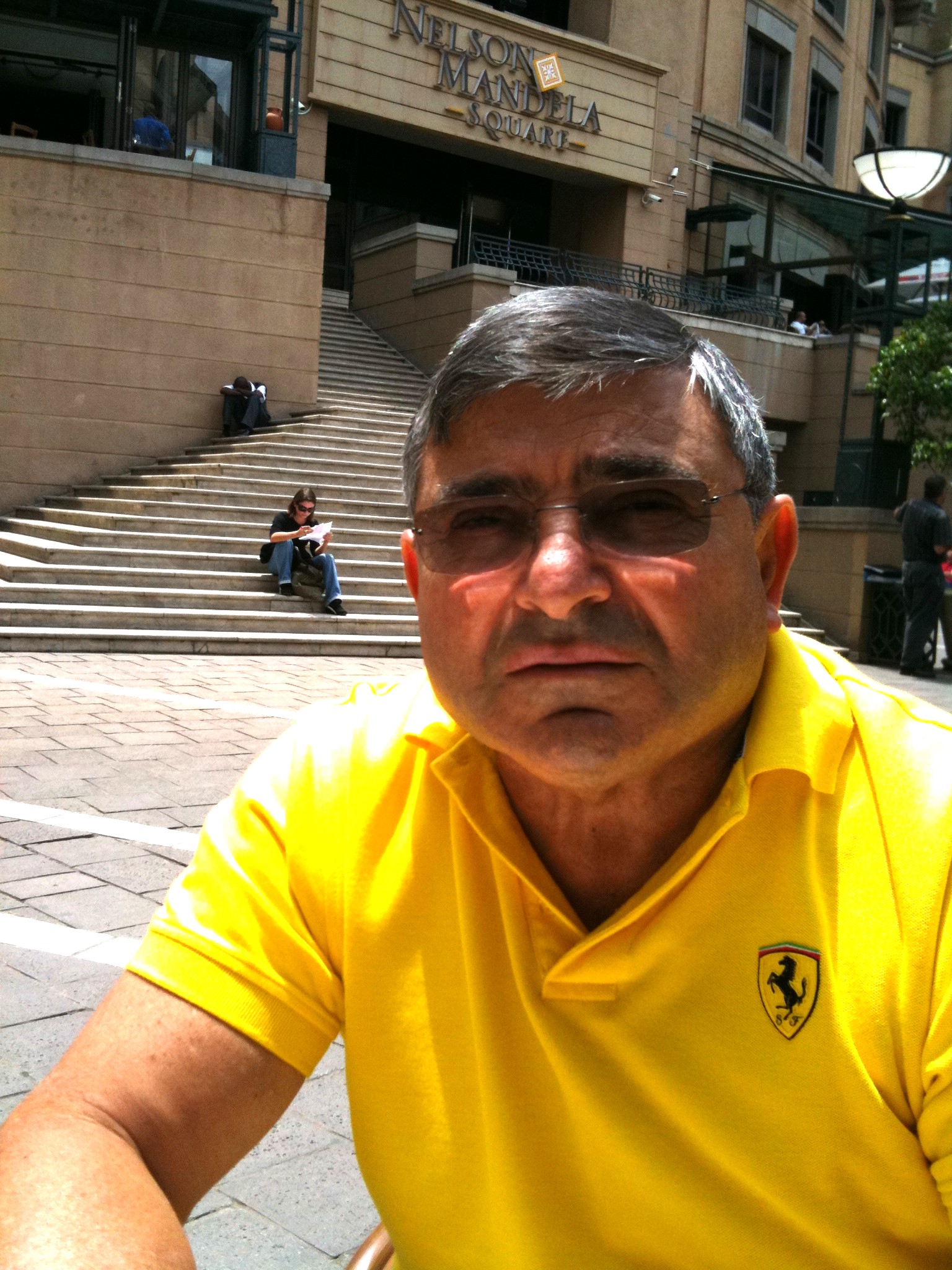
Georges Garbi is the Managing Director (since 1987) of Ortech Consulting Engineers, a notable company working in Nigeria’s water sector. Some stakeholders regard him as the father of Private Sector Participation (PSP) in Nigeria’s urban water sector, pioneered with Kaduna State Water Corporation, where he supervised a private management contract for the Kaduna and Zaria water treatment plants and booster stations. The management contract awarded in 2008 was widely judged to be successfully implemented.
Perhaps, he is controversially best known for supervising Ortech’s Public Private Partnership (PPP) contract with Cross River Water Board Limited (CRSWBL), which was terminated after many years of implementation, and is now a subject of litigation in a Lagos High Court.
A man with dual British and French nationality, Garbi graduated with a Mechanical
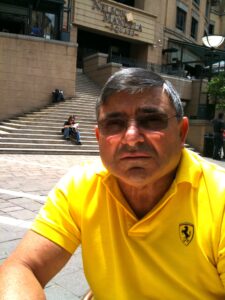
Engineering degree from Ecole d’Ingenieur des Arts et Metiers, Geneva, Switzerland. Garbi, either in an individual capacity or on the platform of Ortech, has also worked on several water projects in Nigeria, including:
- Development of Private Sector Participation programme for Lagos State Water Corporation and several Small Towns Water Supply Projects since 1987.
- Part-time Consultant with the World Bank, assisting in various water and sanitation projects, including the First multi-state Small Towns Water Supply and Sanitation Project in Borno, Kaduna, Katsina and Anambra States (Nigeria) between 1989-1991.
- Under an ORTECH contract, Special Adviser to the Borno State Water Board for a Technical Assistance and Training Project in 1992.
- Project Engineer to the Sokoto State Water Board in the ’90s.
In this interview with Babatope Babalobi, which lasted over 2 hours, Garbi spoke extensively on his experiences and achievements in Nigeria’s water sector, the problems of urban water management in Nigeria and solutions, and utility management issues. Issues related to Ortech’s PPP in CRSWBL, now a court case between the company and Cross River State Government, were downplayed as it is sub judice.
The summary of his views is as follows:
- Former Governor of Lagos State, Asiwaju Ahmed Tinubu, could not solve Lagos Water Supply challenges during his two terms in office due to unwillingness to engage foreign private sector investors.
- Lagos Water Corporation needs to be unbundled to ensure its efficient management.
- Water reform projects should lay more emphasis on rehabilitating the distribution networks in addition to rehabilitation of the production infrastructures.
- Government should continue to subsidise water production as it is not a money-making venture.
- Nigeria’s urban water sector is unviable and unattractive to the private sector. Various forms of water privatization will not work without continued government subsidy on the cost of operation.
- State governments should stop constructing mega water treatment schemes and rehabilitate existing ones or construct small water treatment schemes.
- Water metering can only work where water is running in the pipes 24/7, and Nigeria’s water utilities should not continue to waste funds on procuring and installing water meters, as none is producing water 24/7 presently.
My first question is, who is George Garbi?
I am a French and British National, born in Tunisia, Africa. I left home when I was very young and studied in Switzerland. I went to a technical school based in Switzerland, in Geneva. Afterwards, I had a degree in Mathematics and another in Mechanical Engineering, after which I started my professional career in England. I moved to England and worked there as a Mechanical Engineer in many companies, and after about six years, I decided to leave Europe and move to Africa. My first job was in Congo with a Non-Governmental Organisation (NGO) based in Switzerland. This was how I started my career.
What are your experiences in water utility management? Your critics say you have little experience in this regard prior to your engagement to supervise PSP and PPP projects in the sector.
I joined the World Bank’s local office in Nigeria for about 2 years in 1987. Afterwards, when I left there, after 5 years, I came to Nigeria with the Federal Ministry of Works, working on roads and setting up training centres; afterwards, I moved into the water sector.
One of my first jobs was supervising on behalf of the World Bank, one of the first water projects in Maiduguri. We were constructing a water treatment plant. I was working with the Bank supervising a technical assistance project that, at that time, was carried out by Amsterdam Water Works, a Dutch company, and the World Bank was not very happy with the performance of this company. I asked the World Bank if I could take over the project because it was not going anywhere, and that is how my career in the water sector started in Nigeria. At that time, I worked with the World Bank for about 2 years.
That is interesting. At what point did you join ORTECH? How did you rise to become its Managing Director?
I set up ORTECH in Nigeria.
- ORTECH was launched in 1987, and the first project was in Maiduguri water works. It was a typical technical assistance project with one expatriate Engineer and two Nigerian engineers (one electrical and one mechanical) to train the local people in Nigeria to maintain the facilities. That was the first involvement in the water sector.
- From there on, we started to expand with World Bank projects. Another time also, we associated ourselves with a company called LYSA. LYSA is a part of the Suez group today, a very large French company involved in water and environment and many other things. We worked with them in Nigeria for about 2 years. If I am correct, we worked on a project in Katsina, Kaduna and other places. Later, they decided to leave Nigeria, and we, ‘ORTECH’, bought the LYSA company. It was a consulting company. We kept the name with approval, so we now have a group of companies called LYSA and ORTECH.
- In the water sector, we were getting involved in more and more projects. Sometimes I think in the 90s, what they called National Water Rehabilitation Project. The objective of that project was to rehabilitate different water works and water facilities in every single State. This was a huge project, and the budget provided something like Six hundred million dollars divided into the 36 states, if I am correct, and each State received about 20 million. We picked up quite a few of them because of our experience going through the normal procedure of World Bank procurement, etc. So, slowly we gained much experience in the water sector somewhere.
Despite your rich experiences in the water sector, your critics allege you are not on the ground, maybe with only a one-room office in Victoria Island, Lagos. Why do you think some people have this perception about you and Ortech?
We do not need an office because our office was in the water boards. In Lagos, we maintain a very small office coordinating our company’s finances, etc. In every project we had, we had an office like in Calabar.
You also did some work for Lagos Water Corporation.
Lagos Water Corporation is a different story, and we did a Technical Assistance project. The World Bank came and wanted to rehabilitate Lagos Water Corporation. We have supervised repairing some of the pumps in the two large facilities. We started our involvement in Lagos Water Corporation by supervising the rehabilitation of this equipment. The pumps and about nine big generators. I cannot remember the sequence because it was long ago. We started getting involved with Lagos Water Corporation by putting some prepaid meters we discovered in South Africa.
Why Tinubu could not solve Lagos Water problems.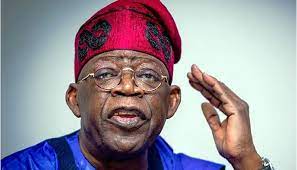
We were the first to do it many years ago. When the World Bank came after the Abacha regime, we negotiated with the World Bank and Lagos Water Corporation Government to conduct the study. At that time, it was to privatize the waterworks. We did the study for 4 years, during which I was consulted as a consultant in association with another consultant from South Africa. We studied how to privatize Lagos Water Corporation we have gone very far. The study costs four million dollars. The IFC was involved.
This was when Tinubu came in. He tried for the water and power problem. He invited the IFC, they were interested, and they signed an agreement which is called the success fee. For the water project, he signed this agreement with Enron. We were the main consultant- Ortech, and at the end of the four years, it was agreed that Lagos State Water Corporation would be split into two large contracts. One contract was to look after the mainland distribution, plus the treatment plants and one was looking after the Island distribution, etc. It went very far. A government delegation visited, and four large companies were selected, two British and two French. The idea is for each company from each country to get one of these contracts.
The Water Corporation derailed the arrangement. This new management convinced the then Governor that it was unnecessary to involve foreigners, and the whole thing collapsed. Etc. I went to talk to the Governor at that time, which was Tinubu. I told him, sir, there is nobody, no private company, foreign or local could invest in what needs to be done in Lagos Water Corporation.
One of the things we told him was that this company has to be broken up because it is too big.
Nowhere in the world is a company under one person having to provide one to nearly twenty million people. It does not exist, even in China.
So, they finally broke the company into 10 districts or divisions, but they kept them under one Managing Director. That idea was not okay; we thought it should be like what they did with NEPA. Create ten companies separate with ten Managing Directors. However, the Managing Director then was very influential and powerful, and of course, it never went anywhere. We were not interested again.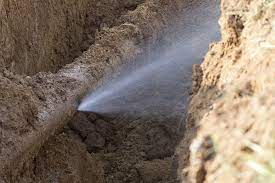
Moreover, it never worked. That is why when we talk about providing portable water in the tap 24/7, in Nigeria, the figure is 0%. Some international organizations keep putting in their reports as 10% or 2%, but I am sorry, it is 0%.
Are you saying that until they go back to your recommendation and decentralize or unbundle Lagos Water Corporation, it will continue to have challenges in providing water for over 20 million people in Lagos?
There is nowhere, even in China, that one person or organization can run such a place. It is impossible. It has to be broken, perhaps into more sections or divisions.
What did you do in Cross River State?
We were running the water board in Calabar. We ran Calabar PPP under two administrations. The Calabar project was signed under Donald Duke one year or eighteen months after he took over, and we finished that term. We signed the agreement for another four years, and then, the next Governor, we ran it for eight years. So basically, we ran for about thirteen years in Calabar.
In Calabar, we also did technical assistant projects with the world bank in the national project. We were typically repairing, retraining, and teaching people. During those years, there was an International Development Bank (IDB) project in Calabar. It was a loan of 110m dollars to build facilities in Cross River states, Calabar and two other places. The plants were built and designed by a Swiss company, an international contractor.
What lessons did you learn from managing urban water projects in Nigeria?
One big mistake many international organisations make when discussing the water project, the treatment plant itself is not a problem. Nobody thought of how to deliver water to the people. The distribution in Calabar was 100 years old. I often criticize people that international organisations like the World Bank give a loan, they should have put 25% – 30% into producing water and 70% into piping the water, but that was never done, and they keep making the same mistake.
When the Calabar plant was finished, 95% of the money was spent on the treatment plants. Out of 100% water pumped out, only 5% reached the taps. So, when we came, we tried to convince the Government to spend the rest of the money to make new connections.
Even as an operating or private company, running a treatment plant is maybe 20% of the headache. You need some revenue to keep all these things going. So, I am trying to say that in any new project, they should emphasise distribution more. It is better to build a small plant and give water to 5,000 people than spend all the money on building plants that do not give water to the people.
Despite its disaster, I admire what has been done in Nigeria’s power sector. The water sector is still very much in the hand of the government, something like Lagos. 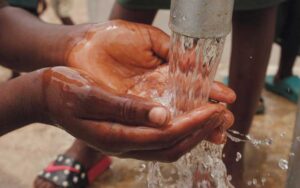
There are so many challenges associated with water metering in Nigeria. Several water utilities have installed meters, and the metering system collapses after some time. So, my question is, can water meters work in Nigeria, and what brand of meters do we need?
Thank you very much, sir. I laugh because this is one of our specialities. We introduce all these prepayment meters in water in Nigeria. Years ago, we installed them in Lekki, Lagos. We installed about 900 of them, and keeping them working was difficult.
Okay, there are two basic types, one is called a jet meter, and the other is a volumetric meter. That is the technology.
- The volumetric meter is very accurate; it is used in Europe, and you must have very clean water going through it. If you put the volumetric meter and a grain of sand founds its way inside, it will seize up.
- So, in Africa, a jet meter is used, a little jet of water that turns the turbine. This is not approved in many Europe countries. If you stop water going through all water meters in one month, throw them away because once you stop pumping water into the pipe, the air gets into it, and when you start pumping again, the water goes about 20 times faster. So that was one of the basic problems with metering and why they never work. The meter is lubricated with water. Stop water for a month or one week, and you can take all your meters in the dustbin.
In Nigeria, what you need first is water. If you cannot pump water or leave water in the pipe all the time, forget about the metering. Please do not do it. You are wasting your money. If you can do that, you go back to the basic meter, a little meter you can sell to people.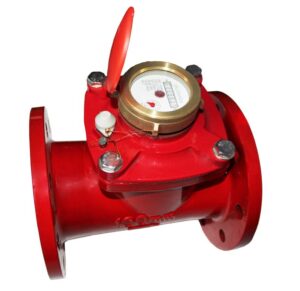
For the past 40 years, Nigeria has probably spent millions of dollars procuring water metres. It is still doing so thanks to International Institutions and Donors. All this money went down the drain. Some of these water meters were never installed and found their way back into the market, while others had an operational lifetime of a few days to a few months.
To take advantage of water metres benefits, water must be flowing uninterrupted in the pipes.
This is far from the case in Nigeria. It can be said that nowhere in Nigeria does water constantly runs 24/7 in the pipes. A meter that is not permanently wet will size after a few days and cannot be repaired. Air replaces water when there is a water interruption in the pipes. The pipes are then full of air. When water gets back into the pipes, the water will push the air out, and the meters, if still working, will run at a crazy speed and record the air; that will give a completely false reading, and people will be billed thousands of Naira for this air.
So, if water cannot be guaranteed 24/7 in the pipes, money spent on metering is wasted.
This is what has been happening in Nigeria.
Yes, some meters will only measure water, not air, but these meters are out of reach and very uneconomical to install.
- These meters could cost anything between 150 and 250 USD each. They are called Induction Meters. These types of meters have been installed, as pilot schemes, in Nigeria but have all been abandoned. These meters have other issues. Trials in some rich middle east countries have been a failure.
- On the other hand, if water supplies are not metered, an astronomical quantity of water is wasted. This is one of the reasons why in most water reticulation systems, only the people living near water towers or water treatment plants get water. These houses consume the totality of water produced. As a guess, if no water meters are installed, water loss could be in the region of 70% to 80%.
How does a basic meter work?
It is with the jet meter. You cannot have a volumetric meter because people are not careful when they go to repair. The normal meter is very simple. It has a little hole and a little wheel, but if you stop water getting into it when the new water comes in, it pushes the air in the pipe and will run this little wheel at a very high speed.
Will you say Nigeria is not ready for water metering, especially since we cannot produce and distribute 24/7.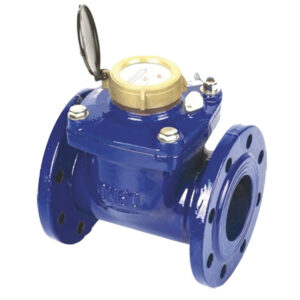
Exactly what I told you, sir. If you cannot produce 24/7 or have your pipes full constantly, forget about meters. So, back to metering, if you do not have 100% water all the time, do not waste money.
You have implemented management contracts in Kaduna and Cross River State. What model of PPP will you recommend for any State government or water utility?
- Unlike a distribution company, the water sector is not financially viable for private companies.
- Unfortunately, you need to subsidize a lot by the Government and maybe even an international donor. Many waterworks in Nigeria are designed in phases so you can run one pump. To begin with, you can run one tank. You can distribute water to 5,000 people and not 500,000 people or 1,000,000 people. First, you need an investment. No private sector will get involved and find the money to repair this plant first. This is where I think the international agencies will come in to finance the project. If the consultant is the one that’s going to run the facility, believe me, the quality of the Rehab work would be much higher. So, this is my experience.
- Then the issue of distribution, practically, privatization is the best thing. The operation is given a full handover. Sometimes, we talked with some governors and tried to sell them this idea to hand over to them. The first question they ask is, who buys the chemical? They have forgotten that chemicals represent maybe 25% of the cost of producing water. All we want is the water’s quantity and quality; the rest is not my problem. Another question one of the governors in the east asked was, ‘how much will you sell the water’? We said N159, and he said the water board wants 20% of that amount every month. You should be paying us, not we are paying you. You give us scrapped, and we have spent money to put it right.
Water production is not for making money for the government but should be subsidised.
- This is one of the problems that there is a lack of financial understanding from all these politicians, and they think that the water board is a money-making machine. Your objective should be to give clean water to the people. Forget about making a profit or if you cannot do it.
Do you think Nigeria’s water utilities are ripe for concession contracts?
Where will you find a company that will want to buy, or if it is handed over to them free of charge? In a way, that is how you should be. A government should hand over the facilities to a company to run them. They have 60% or 100%, or whatever it is. This sort of thing we discussed in a group because even the distribution company today, many of them are bankrupt, seized back by the banks, and run by staff whom the banks pay.
Some people have advocated handing over the management of all state water utilities to the private sector.? Do you think the private sector is ready to take this responsibility?
Of course, it is possible, but there is a condition, how do you pay that contractor? This means that to break even as a private company, I need to charge 1,000 naira per cubic meter. Some people pay 20,000 thousand Naira in Lekki, but can you imagine people in Ekiti, Kano or Calabar paying 20,000 naira for water? It is impossible. So how do you do it? Maybe there should be a way to subsidize water legally. A private company must be open about production if it takes over. When you produce one cubic meter of water, clean water is delivered to a house, and you will pay 1,000 naira. It is not easy, but somebody must pay for the water cost.
Let us subsidize water. In Calabar, towards the end, the World Bank wanted to create competition against ORTECH; they did the competitive bidding to do what we are doing. Only one Chinese company replied to date, but the Chinese company said we are just interested in producing water. You pay us for every cubic meter of water we pump from the plant. Nobody wanted to get involved in distributing, collecting money, or anything else.
Do you have any final comments based on your experiences in Nigeria?
- As I told you in the beginning, it is impossible for the private sector, either foreign or local, to solve or invest in Lagos Water Corporation because it is too big. It would need external financial assistance from the World Bank or the if they were willing to come with much money. The water corporation needs money to put them back into working condition, and working on condition does not mean building a new treat with plants.
Nigeria does not need new water schemes.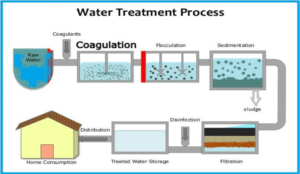
- Sadly, many States are back to building treatment plants because that is what they want. At the same time, they could have just done a good repair to the existing one. You do not need new plants. If I were a Water Resources Minister, I would ban building any new plants.
- So, you have to find a way for Nigerians to give water to the people at a reasonable price.
- Nigerians will pay if you give people clean water daily and charge them reasonably.
Imo Experience with LAISON Metering Solutions
The Imo State Water and Sewerage Corporation is presently faced with challenges of Billings and poor revenue collections as their customers are billed manually on monthly flat rate tariff; with our Customers complaining and quarreling with the Corporation on high tariffs and being made to pay for water not supplied. We have Customers who delay payments and some not paying at all with high historical debts as our collection efficiency was about 5%. These are making us not to break even or make profits from the cost of water production.
We also have problem of water wastages at the houses of our customers due to faulty taps weak pipes that are always bursting; leading to leakages with no serious commitments to repairing them or even report same to the Corporation as they know that their billing is fixed. The Corporation has found itself loosing great revenues due to these sources of non – revenue water (NRW) and loosing water pressure making our water supply not able to reach most of our customers; hereby our water supply operation is badly affected. While some of our Customers see our water supply as a social tool from government and should be free.
Debts continue to increase with no hope of collecting them, these challenges made us to start a Radio advocacy program to educate our Customers on the cost of water production and distribution and the need to make payments to enable us serve them well.
The Corporation was worried and started to seek for solution from LAISON METERING LIMITED, ABUJA through the Country Sales Manager who visited the Corporation and introduce LAISON Meters and their Solutions they offer. He also informed us about their Pilot Projects, whereby they will give us some Meters at no cost to the Corporation for installation at our desired locations; for us to observe the operational efficiency of these Meters in solving the problems of Billings, Non – Revenue Water, delayed, none payments and historical debts from our Customers. The Corporation accepted to give it a trial.
This made LAISON METERING LIMITED, ABUJA to send us their Pilot Projects Questionnaire, which we answered and send back to their headquarter in China; they sent us Memoranda of Understanding (MOU); which we completed, signed and returned back to LAISON headquarter in China.
After this, LAISON METERING LIMITED, ABUJA sent us 20 LoRa Prepaid Water Meters and requested from us to give them an ideal date and time for an online training on the installation of the Meters and the operations and management of the Meters to generate Tokens using their Software. The Corporation gave them date and time for the training and we were trained.
The Corporation staffs after the training installed the Meters at our desired locations.
The results from these locations where these Meters are installed have been great; initially they complained about the tariffs from these Meters. We held meetings with them and jointly agreed on acceptable tariff, after which we now enjoy the best relationship with the Customers; because they are now willingly to pay without us prompting them to do so.
We also observed water wastages and leakages in those locations where the Meters are installed have drastically reduced as Customers are now more disciplined wit water consumption or usage. The Pilot Projects have improved the revenue profile of the Corporation tremendously.
These Meters have improved customer confidence and willingness to pay. The objectives of the Pilot Projects were achieved in the piloted area. We look forward to installing LAISON Meters to every household in our coverage areas.